Transition Culture has moved
I no longer blog on this site. You can now find me, my general blogs, and the work I am doing researching my forthcoming book on imagination, on my new blog.
Come find me at robhopkins.net
Archive for “Local Currencies” category
Showing results 46 - 50 of 63 for the category: Local Currencies.
15 Sep 2010
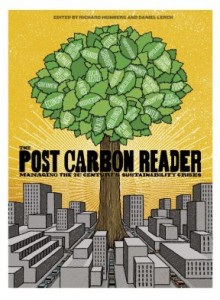 My section of Post Carbon Institute’s ‘Post Carbon Reader: managing the 21st century’s sustainability crises’, due out in October, has just been published online. You can download the pdf of my part here, and can see all the previous pdfs that have been published so far here. For a sense of the final book, you can see the contents page here. It’s going to be a great book. Here is an short extract of my piece:
My section of Post Carbon Institute’s ‘Post Carbon Reader: managing the 21st century’s sustainability crises’, due out in October, has just been published online. You can download the pdf of my part here, and can see all the previous pdfs that have been published so far here. For a sense of the final book, you can see the contents page here. It’s going to be a great book. Here is an short extract of my piece:
Read more»
20 Jul 2010
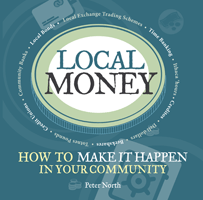 Here is a review of ‘Local Money’ by Jeremy over at MakeWealthHistory. The book can be ordered here. It was also mentioned recently by Lucy Siegle in the Observer.
Here is a review of ‘Local Money’ by Jeremy over at MakeWealthHistory. The book can be ordered here. It was also mentioned recently by Lucy Siegle in the Observer.
“I’ve really enjoyed the last three books to come out of the Transition Books stable, so I was pleased to see the latest instalment was out: Local Money – how to make it happen in your community. It’s another big square book, following Local Food, and it’s got the same practical, inspiring, can-do approach. This time, it’s all about creating local money networks.
Read more»
10 Jun 2010
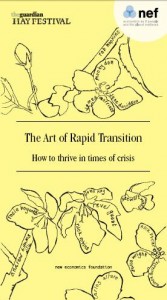 Last year I spoke at the Hay Literary Festival as part of a series of talks that the New Economics Foundation organised. They were very well attended and brought some great speakers together. Now a small book has been produced by nef, edited from transcripts of those talks, and a wonderful little gem it is too. You can order hard copies from nef here, or download it free here.
Last year I spoke at the Hay Literary Festival as part of a series of talks that the New Economics Foundation organised. They were very well attended and brought some great speakers together. Now a small book has been produced by nef, edited from transcripts of those talks, and a wonderful little gem it is too. You can order hard copies from nef here, or download it free here.
Read more»
1 Jun 2010
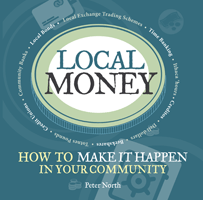 We have 5 copies of ‘Local Money’ to give away. As usual, I have created a fiendishly difficult competition, one that will have you lying awake trying to come up withe correct answer (these things are precious after all, I’m not just giving them away…). So, what follows is a list of alternative currencies, of which 2 are fictitious, and the rest are genuine. If you think you know the two false ones, email me at rob (at) transitionculture.org by 10pm on Sunday 6th June (do not post your answers as comments below!). The first five winners drawn out will win a copy of the book (alternatively you can order one here). So, here is your list of currencies: The Manchester ‘Bobbin’, The Maleny ‘Bunga’, The Hawick Pound, The Chiemgauer, The Baroon Dollar, The Yootle, The Belgooly Spondooley, The Ithaca Hour, The Brixton Pound, The Glasgow Gromit. Good luck, and may the best man/woman win!
We have 5 copies of ‘Local Money’ to give away. As usual, I have created a fiendishly difficult competition, one that will have you lying awake trying to come up withe correct answer (these things are precious after all, I’m not just giving them away…). So, what follows is a list of alternative currencies, of which 2 are fictitious, and the rest are genuine. If you think you know the two false ones, email me at rob (at) transitionculture.org by 10pm on Sunday 6th June (do not post your answers as comments below!). The first five winners drawn out will win a copy of the book (alternatively you can order one here). So, here is your list of currencies: The Manchester ‘Bobbin’, The Maleny ‘Bunga’, The Hawick Pound, The Chiemgauer, The Baroon Dollar, The Yootle, The Belgooly Spondooley, The Ithaca Hour, The Brixton Pound, The Glasgow Gromit. Good luck, and may the best man/woman win!
Read more»
31 May 2010
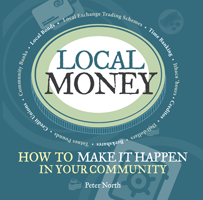
Here is the foreword I wrote for Pete North’s new book ‘Local Money’, which you can now order here. It really is rather fantastic (the book, that is). The book will have its formal launch at the 2010 Transition Network conference (yet another reason to be at 3 days that will blow your socks off). For now, here is my introduction to the book.
The power of holding your community’s own money.
September 2009, Lambeth Town Hall, Brixton. On a beautiful evening with just the first hint of autumn in the air, hundreds of people are packed into the large room for the launch of the Brixton Pound. In the days running up to the launch, the media was full of stories about the currency; it even made the front page of the BBC website on the day. Alongside explanations of how it is intended to work and interviews with advocates were mainstream economists who, somewhat patronisingly, assured readers that this could never really work and that it was all tremendously naive and foolish.
Read more»
 My section of Post Carbon Institute’s ‘Post Carbon Reader: managing the 21st century’s sustainability crises’, due out in October, has just been published online. You can download the pdf of my part here, and can see all the previous pdfs that have been published so far here. For a sense of the final book, you can see the contents page here. It’s going to be a great book. Here is an short extract of my piece:
My section of Post Carbon Institute’s ‘Post Carbon Reader: managing the 21st century’s sustainability crises’, due out in October, has just been published online. You can download the pdf of my part here, and can see all the previous pdfs that have been published so far here. For a sense of the final book, you can see the contents page here. It’s going to be a great book. Here is an short extract of my piece:
 Last year I spoke at the Hay Literary Festival as part of a series of talks that the New Economics Foundation organised. They were very well attended and brought some great speakers together. Now a small book has been produced by nef, edited from transcripts of those talks, and a wonderful little gem it is too. You can order hard copies from nef
Last year I spoke at the Hay Literary Festival as part of a series of talks that the New Economics Foundation organised. They were very well attended and brought some great speakers together. Now a small book has been produced by nef, edited from transcripts of those talks, and a wonderful little gem it is too. You can order hard copies from nef 


